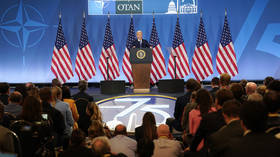Should the US abandon Europe?

Foreign Affairs has published a remarkable article. Under the title, “A Post-American Europe: It’s Time for Washington to Europeanize NATO and Give Up Responsibility for the Continent’s Security,” the authors, Justin Logan and Joshua Shifrinson, make, in essence, one simple argument: the US should leave Europe’s defense to the Europeans because it is no longer in Washington’s interest to do their job for them. Moreover, Logan and Shifrinson add, the Europeans clearly have the resources – economically and demographically – to look after themselves.
This is a smart piece written in the idiom of Realism, that is, the broad school of thinking about international relations and geopolitics which is based on two premises: that states’ interests can be defined and understood rationally, and that most of the time, state leaderships seek to act according to such interests. Logan and Shifrinson also strive to be realistic in the broader sense of the term, acknowledging, for instance, that Russia is not poised to “sweep across” Europe’s NATO member states and poses no hegemonic threat to them. These qualities make their intervention stand out among the “value” pep talks and ideological scaremongering that, unfortunately, often pass for policy analysis now.
Apart from its refreshing quality, there are other reasons to pay attention to this article. Foreign Affairs, belonging to the influential Council on Foreign Relations, is the older of the two journals (the other being Foreign Policy) that set or reflect the agenda of debate among the US international policy establishment (aka, courtesy President Obama’s former National Security Adviser Ben Rhodes, “the Blob”). Logan is the Director of Defense and Foreign Policy Studies at the Cato Institute, an influential libertarian-conservative think-tank. Shifrinson is a prominent, though in today’s climate certainly not universally loved, expert on US foreign policy who has repeatedly taken unpopular positions, such as reminding the West that promises made to Russia after the end of the Cold War were indeed broken and criticizing the American over-engagement in Ukraine as well as NATO expansion.
For Logan and Shifrinson, the US has only one national interest with regard to Europe that can justify taking over its defense: “Keeping the continent’s economic and military power divided” to prevent the emergence of a regional hegemon, be it Germany – tried twice, defeated twice with US help – or the former Soviet Union, in the case of which it’s actually unclear if it ever even intended to build an all-European hegemony (not the same, of course, as the eastern European sphere of influence it maintained between 1945 and 1989). In any case, Washington thought it might.
Today, Logan and Shifrinson argue, the danger of such a European hegemon that could bundle resources to ultimately challenge US power in one way or the other has disappeared. In particular, they – correctly – insist that Russia does not pose such a threat. Thus, they conclude, “with no candidate for European hegemony lurking, there is no longer any need for the United States to take the dominant role in the region.”
There is, it is true, a twist to their argument that will make readers in, for instance, the Baltics very uncomfortable. With the sharp, cold eye of the Realist, they spot a difference between, on one side, those parts of Europe that must under no circumstances ever fall under Russian influence – “the core areas of military and economic power” – and, on the other, small nations in eastern Europe that simply do not matter much to the US national interest. “France and Latvia,” they write with bracing candor, “are both European countries, but their defense needs—and relevance to the United States – differ.” It is always a chilling sensation when the policy wonks from the “indispensable nation” start telling you that your nation is dispensable.
Logan and Shifrinson spell out some recommendations. As a whole they boil down to a gradual – but not slow; the term “several years” appears, not “several decades” – withdrawal from providing security for the Europeans, while dishing out tough love to them to stimulate their abysmally lacking self-reliance in matters of spending, weapons manufacturing, and fielding their own modernized armies. Last but not least, while the US would stay in NATO, it would push the Europeans to run – and, clearly, finance – the outfit. The best of both worlds for Washington: no need to leave or dismantle NATO, a foot in the door and a place at the table, but no longer having to make it work.
For the US, Logan and Shifrinson point to the large rewards of such a policy against a background of, as we used to say in the ‘90s, imperial overstretch. A country “staring down $35 trillion in debt, a $1.5 trillion annual budget deficit, a growing challenge in Asia, and pronounced political cleavages… with no indication that the fiscal picture will improve or evidence that domestic pressures are abating” should listen up when advised that the estimated “budgetary savings of shedding the conventional deterrence mission in Europe” would be at least 70-80 billion dollars per year. Not to speak of the reduction in military risks, political headaches, and – let’s face it – exposure to recurrent Euro-peskiness.
So far, so plausible. In some regards, it is hard to disagree with this argument. Yes, the US should get out of Europe, and yes, that would be good for Europe, too. If anything, Washington should remove itself even more thoroughly than Logan and Shifrinson suggest. They are also right that this US retreat from dominating Europe should have begun, at the latest, in 1991. That would have saved us all a lot of embarrassing outcomes and bloody trouble, including Kaja Kallas as de facto EU foreign minister and the war in and over Ukraine.
Speaking of which, clearly, the timing of this Foreign Affairs article also matters. Regarding that war, Logan and Shifrinson of course imply that it would also be handed over to the Europeans, which is another way of saying, the US should cut its losses and let Ukraine lose (which it will anyhow). That is a position that converges with what we know about the thinking of presidential candidate Donald Trump (which is not necessarily reliable).
Yet, since the Democrats have finally unburdened themselves from the liability of the obviously senescent candidate Joe Biden, it is no longer easy to predict who will win the presidential elections in November. If a Trump victory were still a foregone conclusion, as it used to be, it would be easy to predict that Logan and Shifrinson’s general call to stop babying the Europeans (to paraphrase Harry Truman) will also resonate with a future administration. But even under a Kamala Harris presidency, deep pressures of economic overload and domestic polarization would continue. One thing is certain: the question of a US retrenchment away from Europe will not go away.
With all the perspicacious points they make, though, there is also something curiously dated about Logan and Shifrinson’s argument. Even while they formulate an alternative to the current American mainstream, their analysis, at least as far as it goes in their Foreign Affairs article, is oddly “Eurocentric” and narrowly “Atlanticist.” They promise that freeing up US resources in Europe would make them available for “Asia.” But it is as if they disregard two pertinent key developments of the last, more or less, quarter-century: namely, the rise of a new multipolar order and the emergence of what is a de facto Chinese-Russian alliance. Add BRICS+ powers such as India, and you can glimpse the outlines of a near-future geopolitical pole of not simply economic and military force but constantly growing attraction.
In other words, the space that is actually at stake is Eurasia, not Europe. And while it is true that traditional or former European great powers, such as Britain, France and Germany are very unlikely to develop the capacity (which, especially under Realist premises, trumps intentions) for hegemony, in a world featuring a new Eurasian hegemony, a marginalized Europe would not even want to stay apart; instead, its elites would learn to transfer their loyalties. In such a scenario, however, the US would not just leave but lose Europe. Logan and Shifrinson’s imagined end state of America unburdened of having to defend Europe, and a newly self-reliant Europe nonetheless staying securely on Washington’s side, is more likely than not to be a transitory phase instead. And it should be.
The statements, views and opinions expressed in this column are solely those of the author and do not necessarily represent those of RT.















